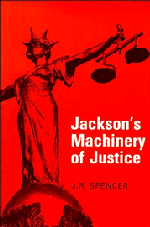Book contents
- Frontmatter
- Contents
- Acknowledgements
- List of figures
- List of tables
- Preface
- Preface to the first edition of ‘The Machinery of Justice in England’
- Abbreviations
- I Historical introduction
- II Civil jurisdiction
- 4 Civil law and criminal law
- 5 County courts
- 6 The High Court
- 7 The mode of trial
- 8 Complaints about the civil courts
- 9 The enforcement of judgments and orders
- 10 The Civil Division of the Court of Appeal and the House of Lords
- 11 The Judicial Committee of the Privy Council
- 12 Arbitration
- III Tribunals
- IV Criminal jurisdiction
- V The personnel of the law
- VI The European dimension
- VII The cost of the law
- VIII Law Reform
- Appendix A The Report of the Civil Justice Review
- Table of Cases cited
- Table of Statutes cited
- Table of Stationery Office publications cited
- Index
7 - The mode of trial
Published online by Cambridge University Press: 10 January 2011
- Frontmatter
- Contents
- Acknowledgements
- List of figures
- List of tables
- Preface
- Preface to the first edition of ‘The Machinery of Justice in England’
- Abbreviations
- I Historical introduction
- II Civil jurisdiction
- 4 Civil law and criminal law
- 5 County courts
- 6 The High Court
- 7 The mode of trial
- 8 Complaints about the civil courts
- 9 The enforcement of judgments and orders
- 10 The Civil Division of the Court of Appeal and the House of Lords
- 11 The Judicial Committee of the Privy Council
- 12 Arbitration
- III Tribunals
- IV Criminal jurisdiction
- V The personnel of the law
- VI The European dimension
- VII The cost of the law
- VIII Law Reform
- Appendix A The Report of the Civil Justice Review
- Table of Cases cited
- Table of Statutes cited
- Table of Stationery Office publications cited
- Index
Summary
Matters of procedure are governed almost exclusively by Rules of Court made under powers given by statute. The High Court and the Court of Appeal are governed by the Rules of the Supreme Court, which are made by a Rule Committee that consists of: the Lord Chancellor, the Lord Chief Justice, the Master of the Rolls, the President of the Family Division, the Vice-Chancellor and three judges of the Supreme Court, two practising barristers and two practising solicitors. The three judges and the barristers and solicitors are appointed by the Lord Chancellor. The Rules that are made must be published and laid before Parliament. County court Rules are made by a committee of five county court judges, two barristers, two registrars of county courts, and two solicitors, all appointed by the Lord Chancellor. The Rules then have to be submitted to the Lord Chancellor, who may allow, disallow or alter them. In all cases the Rules are subject to the limitation that, being delegated legislation, they can be valid only within the scope of the powers given by Parliament, but since the rule-making power is so largely vested in judges, it is unlikely that judges will find that the statutory power has been exceeded.
- Type
- Chapter
- Information
- Jackson's Machinery of Justice , pp. 69 - 78Publisher: Cambridge University PressPrint publication year: 1989

